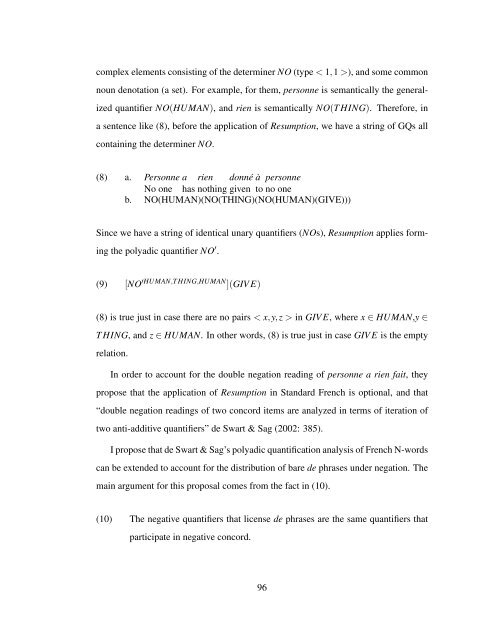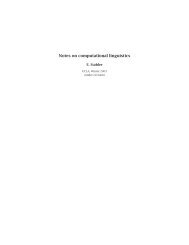Formal Approaches to Semantic Microvariation: Adverbial ...
Formal Approaches to Semantic Microvariation: Adverbial ...
Formal Approaches to Semantic Microvariation: Adverbial ...
You also want an ePaper? Increase the reach of your titles
YUMPU automatically turns print PDFs into web optimized ePapers that Google loves.
complex elements consisting of the determiner NO (type < 1,1 >), and some common<br />
noun denotation (a set). For example, for them, personne is semantically the generalized<br />
quantifier NO(HUMAN), and rien is semantically NO(T HING). Therefore, in<br />
a sentence like (8), before the application of Resumption, we have a string of GQs all<br />
containing the determiner NO.<br />
(8) a. Personne a rien donné à personne<br />
No one has nothing given <strong>to</strong> no one<br />
b. NO(HUMAN)(NO(THING)(NO(HUMAN)(GIVE)))<br />
Since we have a string of identical unary quantifiers (NOs), Resumption applies forming<br />
the polyadic quantifier NO ′ .<br />
(9) [NO ′HUMAN,T HING,HUMAN ](GIV E)<br />
(8) is true just in case there are no pairs < x,y,z > in GIV E, where x ∈ HUMAN,y ∈<br />
T HING, and z ∈ HUMAN. In other words, (8) is true just in case GIV E is the empty<br />
relation.<br />
In order <strong>to</strong> account for the double negation reading of personne a rien fait, they<br />
propose that the application of Resumption in Standard French is optional, and that<br />
“double negation readings of two concord items are analyzed in terms of iteration of<br />
two anti-additive quantifiers” de Swart & Sag (2002: 385).<br />
I propose that de Swart & Sag’s polyadic quantification analysis of French N-words<br />
can be extended <strong>to</strong> account for the distribution of bare de phrases under negation. The<br />
main argument for this proposal comes from the fact in (10).<br />
(10) The negative quantifiers that license de phrases are the same quantifiers that<br />
participate in negative concord.<br />
96
















